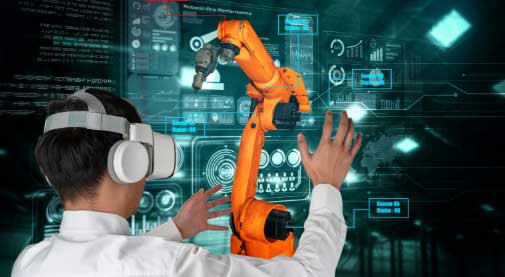Introduction:
Smart Factories are a matter of present and future these days. Survival in the manufacturing markets requires you to adapt and work in line with the Industrial Internet Of Things. Industry 4.0, also known as IIoT, is all about inculcating digital transformation development, along with connectivity evolution.
With the adherence of forward-looking technologies such as cyber-physical systems, alongside IoT, Cloud Technologies, and Cognitive Computing, Industry 4.0 facilitates smart autonomy in the manufacturing processes. Thereby also adding substantial value in the production process optimization. The process of manufacturing actually marks an intersection of people, processes, workflows, services, IT systems, production equipment, and other physical assets. Industrial IoT thus aids numerous departments, manufacturers, suppliers, and consumers, aiding them with self-diagnosis and new levels of analysis for improved productivity.
Market Outlook:
The above-discussed premise is further supported by the prevailing market perspectives, which could be read as – The IIoT market is anticipated to rise at a sober CAGR of 20.6% from the present value of USD 64.9 billion to USD 165.5 billion by the end of 2026. (Source: Markets and Markets)
These statistics denote a positive turn in the domain of Industry 4.0, where Artificial Intelligence and the Internet of Things, being the main influencing factors. The reason being AI/IoT integrated systems provide ample benefits like manufacturing process optimization, delivering early alerts, high-quality outputs, and equipment failure forecasts. Moreover, it helps manufacturers accumulate precise data and employ the same to develop innovative applications to let them achieve a competitive advantage.
Hence, the manufacturing sector, driven by AI and IoT, serve the market’s sprawling demand relating to industrial robots, 3D printing, additive manufacturing, blockchain technology adoption, and likewise. Having known the premise and the market outlook very well, let’s now gain a glimpse of what’s the force behind Industry 4.0…
Key Enablers of Industry 4.0:
While the manufacturing industry’s potential grows, it’s time to have a brief look at the key facilitators of IIoT, the most-cherished digital transformation –
Internet Of Things:
IoT, when integrated into the embedded systems, allows them to communicate via centralized devices. For instance, the embedded systems would require various sensors allowing them to link with the centralized servers through IoT Gateways or the existing devices. This connection further helps the embedded systems build direct communication from the sensor to the server, hence facilitating data gathering from the real-time systems.
Big Data Analytics:

With Big Data, manufacturing units are empowered to analyze large data quantities to detect popular patterns and drive the statistical relationships. This process helps model the data, allowing manufacturers to undertake informed and timely decisions. The analyzed result usually comprises marketing trends, consumer preferences, the average time to failure, the average time between failures, etc. It could therefore be known that Big Data Analytics plays a crucial role in IIoT as a vital enabler of AI/ML, provided that it supports lean inventory, on-time manufacturing, and predictive maintenance as it helps monitor and control the production process to attain maximum efficiency.
Machine Learning:
With machine learning, the machines could be empowered with the capability to perform the tasks autonomously as they could get constant updates themselves from experience with little human intervention. Machine Learning’s process includes analysis of data gathered previously, deciphering instructions given to machines over a period of time, and decisions undertaken with/without human intervention.
Cyber-Physical System:
Cyber-Physical System is basically a smart factory environment equipped with robots or controllers driven by AI/ML. The AI/ML, with the help of sensors placed in the storage, could access the gathered data, thereby autonomously managing devices in an IoT Ecosystem. This further ensures that the manufacturing operations are not only monitored but also coordinated and controlled for optimum output.
Cyber-Security:
Cyber-Security ensures the protection and privacy of digitized infrastructure and data. Industry 4.0 is continually witnessing improvement and advancement in cybersecurity that work towards protecting your assets from threats/attacks. Hence, also mitigating the possibilities of production downtime, production equipment malfunctioning, data leakage, and faulty products that could further drive the business towards financial losses and reputational losses.
Cloud Computing:
Cloud Computing take care of conveying seamless and systematic communication and coordination between all the factor systems mentioned above, including the Internet Of Things, Cyber-Physical Systems, and others. Cloud Computing does the job of providing this hyper-connected environment with smooth access to all the IT Infrastructure and IoT-enabled platforms. Thus, leading towards a versatile, scalable, and cost-effective facilitator for Industry 4.0.
Additive Manufacturing:
If we ask what fostered and established digitalization in the manufacturing processes, the simple answer would be Additive Manufacturing. Most often referred to as 3D Printing, it also enables the formation of lighter as well as stronger components for both the spare parts and the prototypes. Moreover, Decentralized Additive Manufacturing can also aid in the reduction of inventory maintenance costs.
Conclusion:
While the third industrial revolution had its roots in computerization and automation of manufacturing operations, Industry 4.0 brings in the power of connectivity, enhanced computing power, and improved storage. Provided the catalysts of Industry 4.0, it could be known that IIoT brings in a better economic scenario with benefits such as quick time to market, high-standard work quality, and informed decision-making. Nowadays, there are many Product Engineering Companies in the market that provide for a comprehensive set of Industry 4.0 services, thereby helping them achieve their automation strategies at a faster pace.



